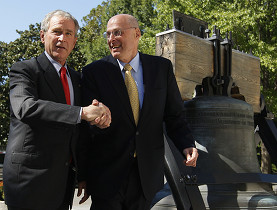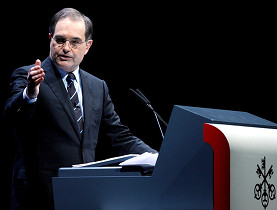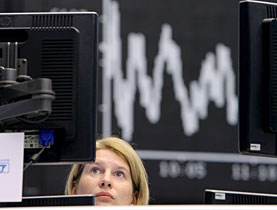Economists unenthusiastic about bank rescue

Many Swiss economists show a distinct lack of enthusiasm about the bank rescue plan adopted by the US House of Representatives on Friday night.
They are warning that the $700 billion (SFr767 billion) package rewards mismanagement and will delay necessary consolidation.
The House had unexpectedly rejected the plan on Monday night, but was then persuaded to accept an amended version. The Senate passed the package on Wednesday.
Yvan Lengwiler, an economist from Basel University, wrote in the German-language Neue Zürcher Zeitung on Saturday that by injecting funds the state was cushioning the banks against the consequence of the risks that they had heedlessly entered into.
“A disastrous incentive has thus been created,” he wrote, warning that the economy could find itself once again in a similar situation in a few years’ time.
Poacher turned gamekeeper
Lengwiler added that there is an unpleasant taste left in the mouth by the fact that US treasury secretary Henry Paulson, himself a former investment banker, should have “come out so ardently in favour of risking a large sum of taxpayers’ money to release the banks from their shabby investments”.
In the Berner Zeitung another Swiss economist, Thomas Straubhaar, director of the Hamburg Institute of International Economics, said that no-one should try to cover up with fine words “the fact that it was in the US – the mother of capitalism – that the state had to throw out an emergency anchor in the shape of a $700 billion package”.
But he warned against drawing the wrong conclusions, pointing out that rise and fall, profit and loss, and success and failure are unavoidable if progress is ever to be made and prosperity to increase.
“Every system which is based on freedom and individual responsibility is superior to all others. History has shown this often enough,” he said.
Psychologically encouraging
The rescue package is simply a confidence-building measure, Beat Bernet, of St Gallen University, told Swiss radio.
This opinion is shared by Bernd Schips, former head of the KOF Swiss Economic Institute. Writing in the St Galler Tagblatt, he called on the government, national bank and the federal banking commission to identify ways to safeguard the banking system if the situation should worsen.
“Merely sitting out” the crisis will do nothing to restore confidence in the financial system, he warned. The authorities must also show what specific steps are planned to control it, to prevent undesirable developments in the future.
“Sensible and reasonable”
One Swiss who has applauded the rescue package is UBS chairman Peter Kurer. Switzerland’s biggest bank has already been forced to write down some SFr50 billion because it took too many risks in chasing after the highest returns.
Kurer does not see the package as “violation of the free market”. On the contrary, he describes it as a “sensible and reasonable intervention”.
“Because this is an extraordinary global crisis, the state can intervene to prevent a complete breakdown of the system,” Kurer told the German-language tabloid Blick. “But the state must not intervene in the longer term, and must afterwards again allow the market the freedom it needs.”
Kurer confirmed that the UBS, which had been badly hit by the financial crisis, had a “direct interest” in the rescue plan, because it has a lot of business in the US. But until the precise conditions are known he said it was impossible to say how and whether the UBS would take part in the plan.
swissinfo with agencies
The turmoil on the financial markets was sparked by the subprime crisis in the US, where borrowers were granted mortgages they were unable to pay back.
This led to a shortfall in liquidity in financial institutions, making it harder for them to carry on their business.
The bank rescue plan hammered out by the US administration and leaders of both Republican and Democrat parties was supposed to stop the collapse of financial institutions by injecting the necessary finance to enable them to continue trading.
The US House of Representatives initially rejected the plan, sparking further alarm on global markets.
The Senate accepted a modified version of the package on Wednesday, and the House passed it on Friday.
Various European governments have already injected money into some of their own major banks and financial institutions to prevent them collapsing.
Leaders of Europe’s four main economic powers met in Paris on Saturday to prepare for a larger summit to deal with the crisis.

In compliance with the JTI standards
More: SWI swissinfo.ch certified by the Journalism Trust Initiative



You can find an overview of ongoing debates with our journalists here. Please join us!
If you want to start a conversation about a topic raised in this article or want to report factual errors, email us at english@swissinfo.ch.